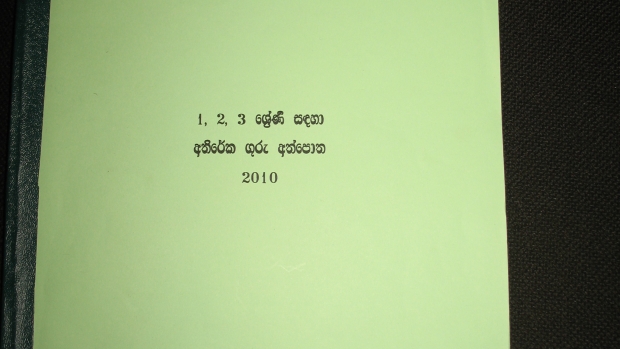Grants :: Small Grant Facilities :: Enhancing schoolchildren’s knowledge of mangrove ecosystems by training their teachers
Enhancing schoolchildren’s knowledge of mangrove ecosystems by training their teachers

Teacher's guide book , Sri Lanka © KEkaratne, 2010
Objectives
This project had two main objectives:
- to introduce environmental activities for primary schoolchildren around Maduganga in support of the national curriculum; and
- to train teachers of selected schools in conducting environmental activities and communicating environmental messages to their students.
Background
Conserving natural ecosystems in Sri Lanka has become increasingly difficult because of conflicts with communities’ attitudes and habits. People exploit mangrove ecosystems, often in response to poverty, and so contribute to environmental degradation and continued social and economic deprivation. This project sought to change the attitudes of the younger generation and strengthen understanding in local communities of how to use ecosystems in non-destructive ways.
The current curriculum for Sri Lanka’s primary school students (grades 1–3) includes environmental topics, but, because teachers lack proper training and guidance, their efforts fall short of the desired outcomes. Recognising this constraint, the Ecocare Centre for Environmental Education and Conservation (ECO-CEN), an NGO which works on environmental education in schools, stepped in to provide teachers in selected primary schools in Balapitiya and Karandeniya Education Divisions, Galle District, with a refresher course and training tools.
Target beneficiaries
The direct beneficiaries were teachers and schoolchildren in the Maduganga area. Indirect beneficiaries included government bodies responsible for conservation.
Outputs
- Preparation of a teachers’ guide for primary school classes.
- Preparation of a set of 13 CDs with 38 documentary films on the environment.
- Preparation of a set of 5 CDs on project activities as a teaching tool, and a CD on mangrove ecosystems as a teaching aid, for 54 schools.
- Raised awareness among local teachers of the importance of the Maduganga River and its surroundings.
- Introduction of “The Song of Culture of Maduganga” in the teachers’ guide.
- Selection of the “Seed Game” which uses Kaduru (Cerbera spp.) seeds, as the Game of Maduganga.
- Nomination of the rathamilla (Lumnitzera littorea) flower as the flower of Maduganga.
- Introduction of E-learning and use of new technology to local schools.
Accomplishments and challenges
As a result of the project, local teachers became interested in the environment of Maduganga and better equipped in terms of environmental knowledge, teaching skills and teaching aids. The area gained a pool of primary school teachers well-versed in teaching environment-related topics, and in producing teaching guides and educational tools. These teachers can be deployed to assist the 32 schools not covered by the project.
The project provided education on mangroves and ecosystems through new tools of learning such as computers. Traditional culture was also used in innovative ways: a song and a seed game were introduced, and the flower of rathamilla (L. littorea) nominated as the flower of Maduganga.
Challenges
Most local schools do not have computers and those that exist are not maintained properly.
Another challenge was the poor public image of NGOs, which made it hard to win community support during the early stages of the project.
Contributions to cross-cutting themes
Communications
The project was notable for the large amount of communications materials it produced on CDs. These comprise a CD on mangrove ecosystems, a set of five CDs with project activities, and a set of 13 CDs with 38 documentary films on the environment. The project also produced a CD of traditional Sri Lankan harvest songs titled Songs for the Environment.
Gender equality
The project targeted all schoolchildren and teachers irrespective of their gender.
Lessons Learned
A difference can be made by changing the educational system to incorporate environmental studies as a subject. This can help to influence attitudes in the younger generation by teaching them about conservation methods and the importance of the Maduganga wetland.
If the project’s outputs are sustained, teachers will approach their classes with greater enthusiasm and confidence; and both students and teachers will enjoy the learning experience more. Before long, schoolchildren in the Maduganga area will have a sound foundation for understanding environmental issues. Their knowledge of the Maduganga wetland ecosystem and its importance should motivate them to protect and conserve their natural heritage.
One important lesson was that, before starting a project of this type, it is important to assess the situation on the ground directly rather than rely on secondary information.
Project Facts
Country
Location
Maduganga, Sri Lanka
Topic
Duration
1st Jan 2009 to 31st Dec 2009
MFF Grant Amount
US$4,386
Implementing Partner
Ecocare Centre for Environmental Education and Conservation
(ECO-CEN)
Environmental Information Centre, YMBA Building, Fort, Galle,
Sri Lanka
Tel: +94 91 2227077
